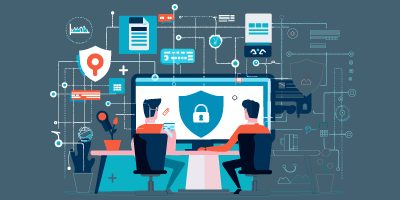Many small businesses think that only larger enterprises have to worry about cyberattacks. The reality, however, is that hackers are frequently targeting small businesses. Cybercriminals go after small businesses because they are perceived as more vulnerable due to limited investments in security. With less effort, hackers can still steal valuable data and enjoy an easier win. A study found that 43% of cyberattacks target small businesses, and yet, only 14% are sufficiently prepared to protect themselves. These numbers further underscore the growing cybersecurity risks for small businesses and emphasize the importance of being prepared.
In this blog post, we explore why cybercriminals target small businesses, common threats, and how businesses can better defend against these attacks.
why do cybercriminals target small businesses?
They are perceived to be vulnerable
Unlike bigger companies, small businesses often do not have the funds to invest in sophisticated cybersecurity systems or hire a dedicated team of security professionals. With these limited resources, many small businesses often lack the capability to consistently monitor their networks to identify and quickly neutralize threats.
“Barring targeted attacks, most attackers are looking for the path of least resistance. And a lot of the time, because smaller and mid-sized companies do not have the security and technology budgets that some of the bigger guys do, they’re often the better target because they’re a little bit more vulnerable from the outside looking in,” GraVoc’s President, Nate Gravel, explained in a Gray, Gray & Gray podcast episode.
In many cases, hackers may employ the same advanced techniques against small to medium-sized businesses (SMBs) that they use to target bigger businesses. Smaller businesses with limited security infrastructure will find it especially challenging to defend against these advanced attacks.
They have a false sense of security
Many small businesses often harbor a false sense of security – a belief that they’re too small to be noticed or targeted by a hacker. This, unfortunately, is not true. While attacks against small businesses may not make the headlines, they are frequently a target for hackers. And, these attacks against small businesses are often more successful because of a lack of preparedness.
They have valuable data
Even if a business is small, it still has a fairly big volume of valuable data, including financial information and personal data from customers or employees. Depending on the industry, some small businesses may even store more sensitive information. If a hacker can crack a small business’ security system, they can steal this valuable data and enjoy a good payday.
They might be the weak link
In many cases, SMBs might serve as the backdoor to the bigger clients or partners they work with. If a small business is a partner, supplier, or vendor to a larger enterprise, for instance, a hacker may try to use the SMB as an entry point to launch a wider attack against the more high-value target.
They may lack of awareness about threats
Often, small businesses may not have enough knowledge about new and existing cyber threats and how to combat them. A lack of employee security awareness training may also leave the business more vulnerable to social engineering attacks like phishing that rely on human error.
common cybersecurity threats that small businesses face
Among The MetLife & U.S. Chamber of Commerce Small Business Index for Q1 2024 surveyed respondents, a majority (60%) of small businesses said cybersecurity threats, including phishing, malware, and ransomware, are a top concern.
Here is an overview of common cybersecurity threats that small businesses face.
Ransomware/ Malware
In a malware attack, hackers use malicious software developed to steal data or disrupt systems. Ransomware is a popular form of malware attack that locks users out of systems, blocking access to mission-critical data and assets until a ransom is paid.
Malware and ransomware attacks can bring operations to a halt and cause a lot of financial and reputational damage to small businesses.
Phishing
Phishing is an increasingly common social engineering tactic where hackers send out fraudulent communication designed to deceive the target into sharing sensitive data. Statistics show that on average, an employee of a small business with less than 100 employees will experience 350% more social engineering attacks than an employee of a larger enterprise.
If a phishing attack is successful, the hacker can gain access to confidential customer data or financial accounts. This could lead to fraudulent transactions, data breaches, or even legal consequences if customer data is exposed.
Check out our blog post to learn more about the top red flags of phishing. You can also learn more about the common types of social engineering attacks here.
Credential Stuffing/ Brute Force Attack
Along with social engineering and malware, we have found that credential stuffing and brute force attacks are also a threat to small businesses.
Credential stuffing involves attackers using stolen username and password combinations, often from previous data breaches, to gain unauthorized access to a business’ accounts. Like credential stuffing, in a brute force attack, hackers systematically try different password combinations until they find the correct one.
Small businesses that don’t have proper password management and multi-factor authentication (MFA) policies risk becoming a victim of such attacks.
how to protect your small business against hackers?
While many small businesses may like to believe that hackers would never go after their data, it’s becoming increasingly clear that SMBs are a frequent target for cyberattacks. The question now is not what to do IF your small business is attacked by a hacker, but more what to do WHEN your company becomes a target. It’s best to take a proactive approach to protecting your small business against cyberattacks.
Here are some things your small business can do to mitigate cyber risks and enhance defenses.
Conduct risk assessments
Conducting regular risk assessments is a great way to understand your risk exposure, identify mission-critical systems, and evaluate the preparedness of your team to detect and respond to a threat. These assessments provide a solid foundation to enhance your security posture and better protect your business.
Educate your team about cybersecurity
The success of many cyberattacks depends on human error. So, we often say that your employees are your first and a very important line of defense against hackers. Make sure your people are trained to identify the red flags of social engineering and other cyberattacks. Invest in regular security awareness training to educate your team on cybersecurity threats and best practices.
Secure your IT infrastructure
Proper password management, MFA policies, patch management, and regular software updates are some of the basic steps necessary to protect your IT infrastructure.
Back up your data
Regularly back up your data so you have a better chance of recovering mission-critical files and assets in the event of a cyberattack.
Have a business continuity/disaster recovery response plan
Having a well-designed business continuity/disaster recovery response plan is essential for protecting your organization from both operational disruptions and reputational damage in the event of major failures or disasters.
Implement MDR technology
Often times, hackers are using more advanced techniques to bypass traditional security systems. Managed detection and response (MDR) technology provides an added layer of defense that is designed to identify this nuanced malicious activity and neutralize the threat at a rapid pace. Having an MDR allows small businesses with limited security resources to leverage advanced threat detection and response capabilities at a more affordable cost.
explore our cybersecurity services for small businesses
Our certified cybersecurity professionals can provide social engineering testing, security awareness training, and other services to better protect your small business against hackers. Click below to explore our information security services or contact us today to get started!
Related articles
Guide to eCommerce Security Best Practices for Your Online Store
This Cybersecurity Awareness Month, we dive into eCommerce security, including common threats, and best practices to protect your online store!
Advanced Threat Detection & Response (TDR) for Small Businesses
In this blog post, we explore the benefits of threat detection & response for small businesses as well as best practices and available MDR technologies.
Expert Take: Why Regular IT Audits Are Important for Businesses
In this blog post, our Director of Risk Management & Audit, Brian Brunelle, explains why businesses should conduct regular IT audits.




